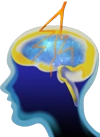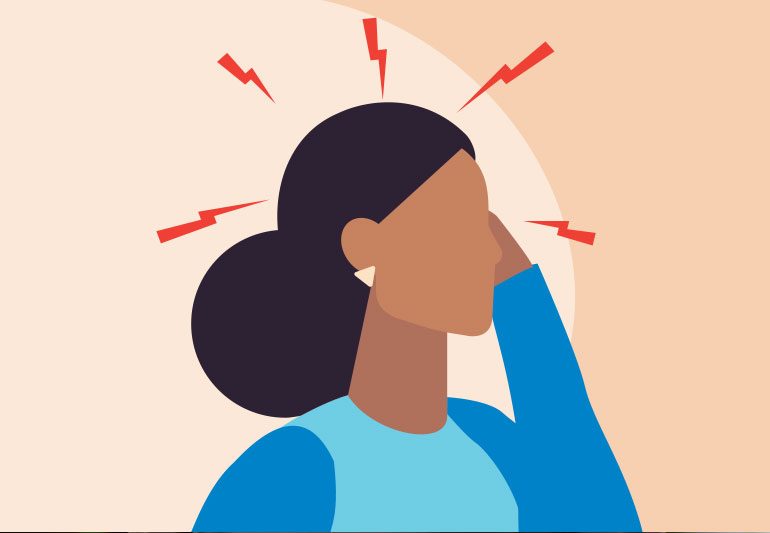Migraine Treatment in Mumbai
Migraine
Migraine is characterized by throbbing pain on one side of the brain. A migraine headache is triggered by a variety of factors, including stress, hormone imbalance, and others. It may be accompanied by vomiting, nausea, eye discomfort, or light sensitivity in certain situations. Migraine episodes create excruciating headaches that may last for hours or even days. The two major categories are migraine with aura (once called “classical migraines”) and migraine without aura (formerly known as “common migraines”). If you suffer from Migraine and need immediate treatment Call our expert Dr. Amit Shah on 9819561456.
What are the Migraine Triggering Factors?
The aetiology of a migraine is unknown; nonetheless, it is connected to aberrant brain activity. The unexpected alterations in the brain have an influence on the normal functioning of the neurological system and result in a chemical imbalance in the brain. The following are the primary migraine triggers:
Stress: Excessive stress might cause a migraine attack in certain people. Aside from stress, emotional triggers such as anxiety, or shock may produce significant pain.
Hormonal Imbalance: Hormonal changes might trigger a migraine headache. During menstruation, women’s hormones often alter, resulting in a migraine.
Physical Ailments: Migraines might get severe if you do not take care of your lifestyle and physique. Improper sleep habits, weariness, shoulder discomfort, and poor body posture may all contribute to the disease.
Medication: Taking contraceptive pills, sleeping drugs, or hormone replacement medications might be triggering.
Environmental Triggers: Certain environmental circumstances might also contribute to headaches. Migraine discomfort may be exacerbated by loud music, flashing lights, strong odors, and smoke. Some individuals may also be bothered by crowds, bright lights, or temperature fluctuations.
Types of Headache
Cluster headaches are the most severe form of headache, causing a searing pain behind or around an eye. It occurs in clusters, for example, three times a day for 2-3 weeks in a month. The pounding ache might continue anywhere from 15 minutes to 3 hours. It produces redness and tears in the eyes, as well as drooping eyelids and pupil shrinkage.
Tension Headache: The most frequent form of headache, affecting mostly adults and teens. The discomfort may range from minor to intense, causing muscular stiffness. It puts pressure on your forehead, back of your head, or neck. It is sometimes referred to as a tension headache.
Thunderclap Headache: A Thunderclap headache is a severe headache that develops fast. A head injury or burst blood vessels are two possible causes. This may become severe if not addressed in a timely manner.
Occipital Neuralgia is a form of headache caused by damage to the occipital nerves. These nerves go from the spinal cord’s top to the scalp. It creates a throbbing pain in the top neck, back of the head, and behind the ears, similar to an electric shock. The discomfort is often felt on one side of the head.
Chronic Daily Headaches: Hemicrania Continua is a kind of Chronic Daily Headaches. On one side of the head, it generates a strong stabbing pain. It may be either chronic or recurrent. It may occur three to five times every day. Women are more likely than males to get this form of headache.
How is Migraine treated?
Migraine is caused by a number of reasons. Furthermore, there is no one therapy that will fully eliminate migraines. The majority of existing therapies are aimed at alleviating symptoms and preventing migraine episodes from occurring in the first place.
Medication Management
Medicines may perform wonderfully for some individuals in relieving migraine headaches and attacks. To alleviate migraine symptoms, the following medications are often prescribed:
Painkillers such as aspirin. The inclusion of caffeine and acetaminophen in the components alleviates severe headaches. Ibuprofen, naproxen, and acetaminophen are examples of over-the-counter medications. Metoclopramide is a medication that is used to treat nausea and vomiting.
Nonconventional treatment
Botulinum toxin injections are used in the surgical treatment of migraines. They are injected into the nerves linked with migraines. Extracranial sensory branches of the trigeminal and cervical spinal nerves are examples. This surgical method has been shown to be useful in the treatment of migraines.
Vagus nerve stimulation is a device used to treat migraines, drug-resistant epilepsy or refractory epilepsy, and depression. VNS treatment or device employs electrical impulses to stimulate the Vagus Nerve, which runs from your brain down your neck to your chest and abdomen on either side of your body.
Noninvasive Vagus nerve stimulation devices which do not need surgical implantation and to treat headaches or migraines, depression, and epilepsy.
Treatment
Anti-Epileptic Drugs: This is generally the first medication that the doctor will attempt to start in order to manage the seizures. The goal is to control seizures as completely as possible while minimising pharmacological adverse effects.
Vagal Nerve Stimulation (VNS): This procedure includes implanting devices to reduce the aberrant electrical activity that causes seizures. They may be considered for persons whose anti-epileptic medicines have failed to control their seizures.
The Ketogenic Diet: This is commonly recommended for children after AEDs have failed to control seizures. It entails tight regulation of fat, protein, and carbohydrate levels and should always be carried out under the guidance of a nutritionist.
Surgery: This is a possibility for patients who have uncontrollable seizures. Despite taking various drugs, around 20 to 30 percent of persons have poorly controlled epilepsy. In such cases, surgery can almost always cure epilepsy. Video-EEG Monitoring and MRI may be used to pinpoint the source of seizures. Seizures are caused by a small portion of the brain that may be readily excised by surgery. In such circumstances, surgery has proven quite effective.
For more information & consultation on Migraine treatment in Mumbai Call our expert Dr. Amit Shah – Consultant Neurologist in Mumbai on 98195 61456 or Book an Appointment

